Racing bike aerodynamics

Road cyclists are focused competitive athletes whose attention is primarily on efficiency and energy-saving progress. An optimised riding position as well as wearing streamlined clothing influences the gain of valuable seconds and can save a few watts of energy.
Wind resistance
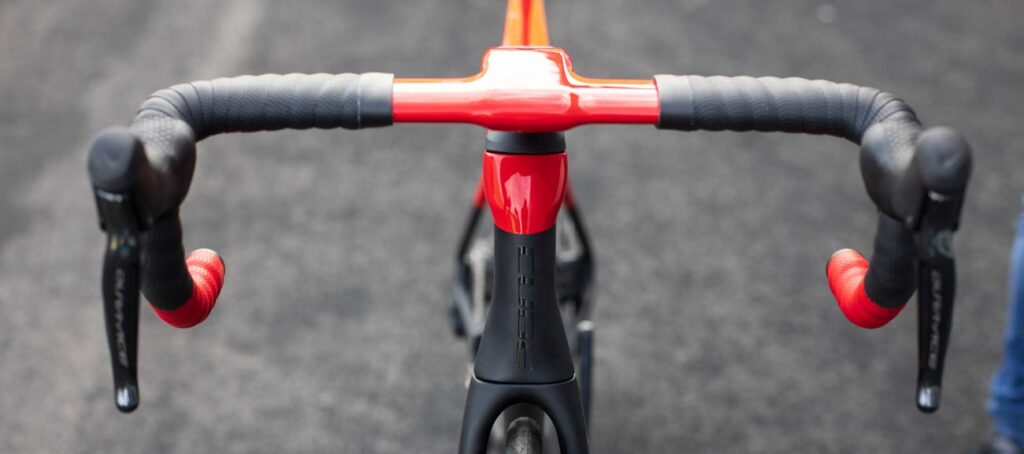
At speeds of about 50 km/h, a cyclist uses almost 90% of his or her energy to fight air resistance. The decisive factor for the resistance is the frontal area and the cw value (drag coefficient). The average cw value for a rider and his road bike is 0.4 – 0.6. This value can only be changed slightly by optimising the seating position. The frontal area (cross-sectional area in the direction of the flow), on the other hand, which is exposed to the wind, can be influenced more strongly.
Michael Konczer has built an interesting wattage calculator on his site. Have a look at it.
https://www.michael-konczer.com/de/training/rechner/rennrad-leistung-berechnen
The right sitting position
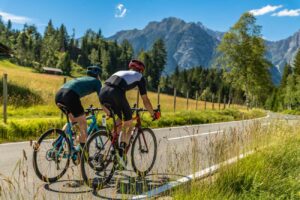
Since the rider causes more air resistance than the bike itself, it is important to reduce the frontal area. To do this, it is necessary to lower the head and turn the arms inwards. After all, the seating position accounts for about 75 % of the total air resistance. With a special aero handlebar (time trial attachment), the frontal area is reduced, because the rider adopts a forward stretched seating position and ultimately achieves a very low air resistance.
Greg LeMond won the 1989 Tour de France by implementing this knowledge and set new standards in aerodynamics. Ideally, an optimised seating position can save about forty watts. In triathlon and long-distance races, six watts correspond to a time saving of about two minutes, which can make the difference between victory and defeat.
The helmet
The head is always in the flow channel and offers a large surface to attack. An aero or time trial helmet ensures that the wind in the head area is diverted from all sides. Meanwhile, there are shorter aero helmets that do not restrict the rider too much and also offer a certain amount of ventilation.
Clothing
When choosing clothes, you should look for tight-fitting jerseys. Loose clothing flutters in the wind and slows you down. One-piece jerseys are the fastest way to go. These have a special fabric structure and are partly roughened so that the wind is better dissipated. With aero gloves or shoe covers you can save a few more watts of energy.
The wheels
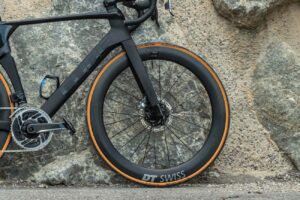
The tyres account for about 8 % of the air resistance – so relatively little compared to the riding position. Nevertheless, for time trials, for example, it is still possible to squeeze out a second or two. High-profile rims can act like a sail in ideal crosswinds and push the rider forward instead of slowing him down. In addition, fewer spokes mean fewer air vortices to brake and thus improved aerodynamics.
High profile wheels are slightly heavier than low profile wheels and less stable in high crosswinds. Therefore, you should think carefully about the use for which you are equipping your road bike.
Frame shape
Opinions differ on the shape of the frame. Does a round tube frame cope better with crosswinds than a carbon frame? Basically, one can say: at high speeds, a specially adapted carbon frame leads the race. With its aero profile, it glides through the wind more easily than round tubes with a large cross-section. Attachments and braking systems should be additionally integrated and receive as little of the airstream as possible
Conclusion
The seating position is the main thing in the fight against air resistance. The other factors mentioned are mainly of interest to time trial riders, for whom every second counts over longer distances. If the factors mentioned are observed, between 70 and 80 watts can be saved. For a distance of 40 km, that’s a whole 6 to 10 minutes.
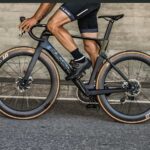
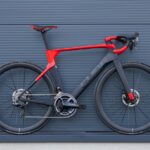
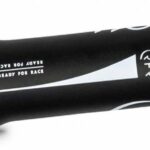




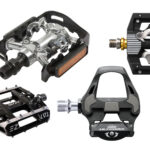











Recent Comments